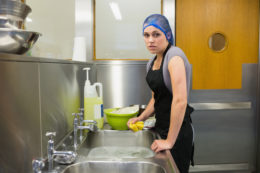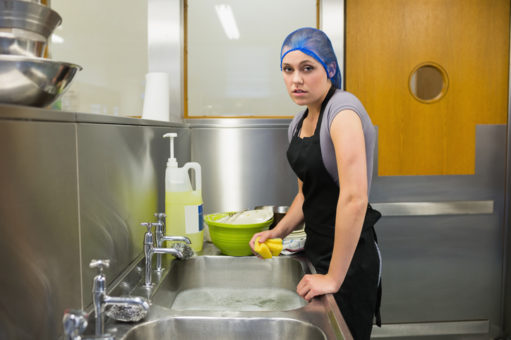
Whether it is chopping fresh vegetables, picking out raw meat, preparing a delicate chocolate dessert or serving a patron a delicious meal or a delicious drink, working in the food industry requires constant exposure to food and can potentially lead you to have an obsession with food and the development of unhealthy coping mechanisms. Immersing yourself in the culinary industry whether it is because you are passionate about food or you are taking a job in the service industry for the sake of paying your bills can be a creative and rewarding workspace however it can be stressful, physically demanding and can lead to both substance abuse and disordered eating. The food service industry is one of the leading sectors for alcohol abuse and substance abuse. In fact, according to recent statistics by the Substance Abuse and Mental Health Services Administration, an agency within the U.S. Department of Health and Human Services, restaurant and hotel workers have the highest rates of illicit drug use by industry. In terms of heavy drinking, miners ranked the highest of all occupations, followed by construction workers and the restaurant/hotel employees. Heavy alcohol use, defined as drinking five or more drinks during a single occasion on five or more days in the past 30 days, had a rate of 12 percent among restaurant and hotel workers. Many in this industry believe it is part of the culture because of the late hours, long shifts, stressful and fast paced-environment and daily cash in your pocket and it has been this way for decades. In his 2000 memoir, Kitchen Confidential best-selling recovery drug user turned international food critic, Anthony Bourdain described the kitchens where he cut his teeth in the ’70s as “insular, chaotic, drenched in drugs and alcohol, and constantly accompanied by loud rock and roll music.” So how can an individual in recovery, whether it is for an eating disorder or a substance abuse disorder, surviving in the food industry with an addiction, let alone thrive in the food service industry?
Can you succeed in the foodservice industry while in recovery?
For many individuals in recovery, working in the foodservice industry may be your passion or may be an entry-level job where you can earn a paycheck while navigating the recovery process. Regardless, being in a fast paced environment where you are always around alcohol, food, and stress can be a nidus for relapse resulting in binging and purging behaviors, food restriction, excessive exercise, alcohol abuse or smoking or injecting drugs. Fast paced environments, limited breaks, intoxicated patrons, and being on your feet all day can be a grueling experience and can break you down, no matter how passionate you are about food. It can be possible to continue working in this industry during your recovery if you take the proper measures such as making sure you bring healthy foods to eat to avoid binging or avoiding working in an environment where they serve alcohol if you are early in your recovery for alcohol or drugs. Additionally, no matter where you are in your recovery process, it is essential to digest any uncomfortable emotions that come up throughout your workday so that they do not trigger disordered food behaviors or substance abuse when you get home after a long shift.
Seeking treatment when working in the food industry with an addiction
If working in the food industry with an addiction and all that it entails is too upsetting or triggering too many unhealthy cravings, it may be time to look for jobs in another industry, for the time being. At the end of the day, no paycheck is worth your mental or emotional health. Making your recovery the first priority in your life is the most important. If you fall behind and relapse then every other aspect of your life can be negatively affected including your job, family and personal life. Recovery is a long road, and many professionals consider it a lifelong journey and therefore keeping active in your recovery community, seeking a support group and maintaining therapy sessions while practicing self-care are all crucial aspects in succeeding in recovery. Of course, it is possible to return to the food industry if that is your passion after both you and your therapist feel that it is a safe environment where you can succeed. However, this may take years to reach this point.
